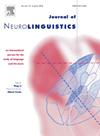Dissimilarity between discourse characters influences the processing of contrastive focus: An ERP study
IF 1.2
3区 心理学
Q2 LINGUISTICS
引用次数: 0
Abstract
The present study used event-related potentials to investigate effects of the similarity or dissimilarity of discourse referents on the processing of contrastive focus during Chinese reading. Participants first read a background story. They then were presented with a series of two-clause sentences using a RSVP paradigm. The first clause of each sentence included the names of two characters from the background story, who were either similar or dissimilar in terms of social category (which was specified in terms of age and gender). The second clause referred to one of these characters by name, using the Chinese focus particle “shi” to focus on this name or not. The results show that focused names elicit a larger P300 than non-focused names. Furthermore, discourse-final words elicited a larger P300 when the focused character was dissimilar rather than similar to the other character, with no effect in the non-focus condition. These findings replicate prior findings showing that the P300 is sensitive to the processing of contrastive focus during reading. The findings also show that the processing of contrastive focus is sensitive to similarity/dissimilarity between discourse referents, and that how this information is used may depend on the pragmatic implicatures associated with contrastive focus.
语篇特征差异对对比焦点加工的影响:一个ERP研究
本研究利用事件相关电位研究了语篇指称物的相似性和差异性对汉语阅读过程中对比焦点加工的影响。参与者首先要读一个背景故事。然后,研究人员向他们展示了一系列使用RSVP范式的两子句。每个句子的第一个子句包括背景故事中两个人物的名字,他们在社会类别(以年龄和性别来指定)方面相似或不同。第二个子句用名字指代其中一个人物,用汉语的定音助词“是”来表示这个人物的名字。结果表明,有焦点的名字比没有焦点的名字引起更大的P300。此外,当被关注的词与另一个词不相似而不是相似时,话语结束语引起的P300更大,而在非焦点条件下没有影响。这些发现重复了先前的研究结果,即P300在阅读过程中对对比焦点的处理很敏感。研究结果还表明,对比焦点的加工对语篇指称物之间的相似/不相似非常敏感,并且如何使用这些信息可能取决于与对比焦点相关的语用含义。
本文章由计算机程序翻译,如有差异,请以英文原文为准。
求助全文
约1分钟内获得全文
求助全文
来源期刊

Journal of Neurolinguistics
医学-神经科学
CiteScore
3.90
自引率
5.00%
发文量
49
审稿时长
17.2 weeks
期刊介绍:
The Journal of Neurolinguistics is an international forum for the integration of the neurosciences and language sciences. JNL provides for rapid publication of novel, peer-reviewed research into the interaction between language, communication and brain processes. The focus is on rigorous studies of an empirical or theoretical nature and which make an original contribution to our knowledge about the involvement of the nervous system in communication and its breakdowns. Contributions from neurology, communication disorders, linguistics, neuropsychology and cognitive science in general are welcome. Published articles will typically address issues relating some aspect of language or speech function to its neurological substrates with clear theoretical import. Interdisciplinary work on any aspect of the biological foundations of language and its disorders resulting from brain damage is encouraged. Studies of normal subjects, with clear reference to brain functions, are appropriate. Group-studies on well defined samples and case studies with well documented lesion or nervous system dysfunction are acceptable. The journal is open to empirical reports and review articles. Special issues on aspects of the relation between language and the structure and function of the nervous system are also welcome.
 求助内容:
求助内容: 应助结果提醒方式:
应助结果提醒方式:


